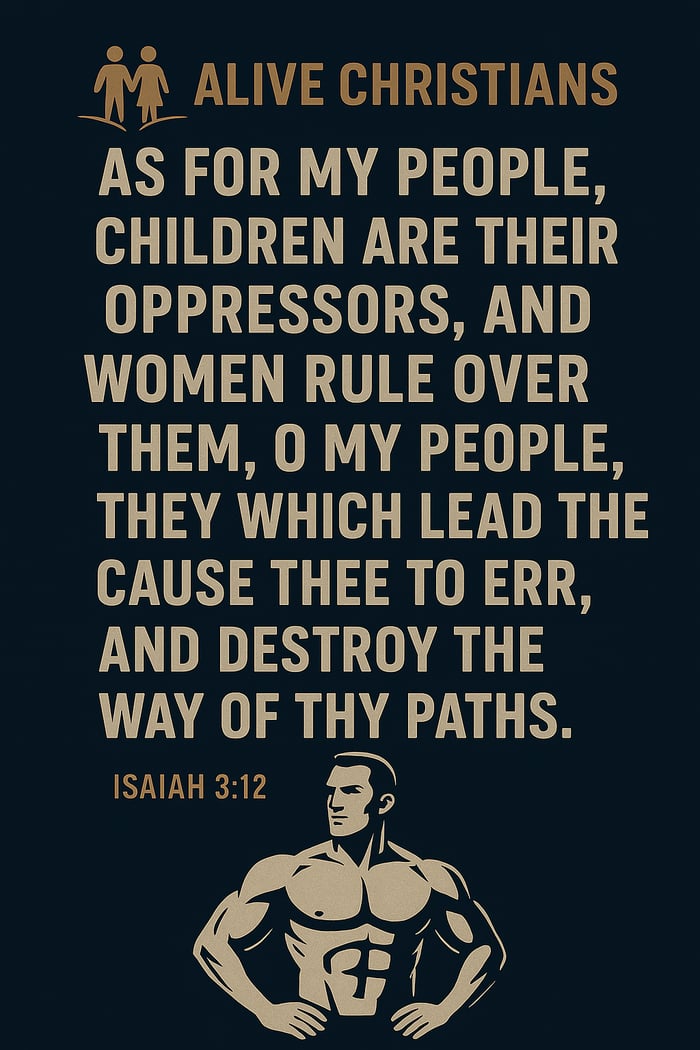Table of Contents
What is the definition of effeminacy?
What is the definition of effeminacy in the bible?
- Effeminacy definition: Effeminacy means taking on the characteristics of a woman, particularly for men who leave their God-given design and role as men to be strong, tending and keeping (Genesis 2).
- It is sinful for men to behave and take on the God-given roles of women, and likewise for women to take on the God-given behavior and roles of men.
- Effeminacy can also mean moral or gender defined weakness. Effeminate men do not work hard or maintain their focus until the job is done.Instead, they like and recline in ease and leisure, forsaking their God-given role in building and protecting according to the Book of Genesis.
- In Scripture, effeminacy means 'softness'.
- Effeminate behavior means weak, uncourageous behavior lacking in zeal and fervor as becoming of a man. It is not standing up for what is right and doing what is right like a man ought to.
- Men are to exhibit manliness and masculine behaviour that exudes strength, courage, hardness, not weak, soft behavior that is in contradiction to their God-given designs and roles.

Effeminacy – Greek Word Study
Key Greek Word:
μαλακός (malakos)
Pronunciation: mah-LAH-kos
Literal Meaning: “soft, delicate”
Expanded Meaning: one who is morally soft, lacking self-control, living in luxury and self-indulgence, or engaging in passive homosexual behavior (in certain contexts).
Occurrences in Scripture
| Reference | Greek Word | Translation | Meaning in Context |
|---|---|---|---|
| Matthew 11:8 | μαλακοῖς | “soft clothing” | Soft, luxurious lifestyle |
| Luke 7:25 | μαλακοῖς | “soft clothing” | Symbol of luxury and indulgence |
| 1 Corinthians 6:9 | μαλακοί | “effeminate” (KJV) | Morally weak / sexually passive |
Meaning in Classical & Biblical Greek
| Nuance | Explanation |
|---|---|
| Soft / gentle | As in clothing or texture (Matt. 11:8) |
| Luxurious / indulgent | Associated with self-pleasing lifestyles |
| Morally weak | Undisciplined, given to sensual pleasure |
| Sexually passive partner | Viewed in Greco-Roman culture as one who yields to unlawful sexual conduct |
Spiritual Significance
μαλακός is not merely about outward femininity — it refers to inward softness toward sin, especially:
lack of self-control
submission to fleshly desires
moral cowardice
refusal to fight against sin
Paired with Another Word
In 1 Corinthians 6:9, Paul pairs malakos with another term:
ἀρσενοκοίτης (arsenokoitēs)
Literally: “male + bed”
Translation: “abuser of themselves with mankind” (KJV), “homosexuals” in modern versions
Refers to the active partner in illicit sexual acts
Thus: Paul condemns both roles in sexual sin — active (arsenokoitēs) and passive (malakos)
“…neither the malakoi nor the arsenokoitai will inherit the kingdom of God.”
— 1 Corinthians 6:9
Effeminacy (malakos) is not particularly about mannerisms, but about morality.
It is:
Self-indulgence
Resignation to sinful desires
A heart unwilling to stand firm
It is the opposite of biblical manhood, which requires:
discipline (1 Cor. 9:27)
courage (1 Cor. 16:13)
sacrificial love (Eph. 5:25)
strength in the faith (2 Tim. 2:3)
Church Fathers on Effeminacy
| Church Father / Writer | Direct Quote | Context / Meaning |
|---|---|---|
| Clement of Alexandria (c. 150–215) Paedagogus II.10 | “It is not lawful for a man to use cosmetics for the eyes, or to make the skin fair, or to pluck out the hairs of the beard, and to seek beauty in effeminacy.” | Effeminacy as grooming/vanity that feminizes men. |
| Tertullian (c. 155–240) On the Apparel of Women I.7 | “What concern has a man with artificial adornments, as if he were not a man? Let him retain his manhood untainted by the effeminate pursuit of beauty.” | Criticizes men adopting feminine habits in dress/appearance. |
| Cyprian of Carthage (c. 200–258) On the Dress of Virgins 9 | “Those who imitate women in their clothing or in soft delicacy condemn the nature God gave them.” | Effeminacy undermines God’s created order. |
| Origen (c. 185–253) Homilies on Isaiah 3 | “Effeminate men are those who yield themselves to pleasure and luxury, unworthy of the courage given to man.” | Effeminacy linked with moral surrender and luxury. |
| Lactantius (c. 250–325) Divine Institutes VI.23 | “What can be more disgraceful, what more contrary to manhood, than effeminacy of body or mind?” | Effeminacy = disgrace, lack of manhood. |
| Athanasius of Alexandria (c. 296–373) Life of Antony 47 | “Antony’s countenance showed neither effeminacy from luxury, nor roughness from neglect, but was wholly natural, healthy, and strong.” | Commends balance: true manliness avoids effeminacy and excess harshness. |
| Basil the Great (c. 329–379) Homily on Psalm 1 | “Effeminacy is the mark of those who shun labor, who seek comfort, who refuse toil; but the righteous man is manly, enduring all things.” | Effeminacy tied to laziness and avoidance of hardship. |
| Gregory of Nyssa (c. 335–395) On Virginity 12 | “Let us flee the effeminacy of those enslaved to pleasure, for such a soul is unmanned and feeble.” | Effeminacy = spiritual weakness caused by pleasure. |
| John Chrysostom (c. 349–407) Homily on Matthew 7 | “Nothing is more shameful than a man who lives in luxury and softness, for such a one is effeminate and unworthy of his nature.” | Effeminacy as luxury/softness. |
| Ambrose of Milan (c. 340–397) On the Duties of the Clergy I.23 | “Effeminacy must be avoided, for it weakens the mind as well as the body, unfit for virtue and for the service of God.” | Links effeminacy to moral and spiritual unfitness. |
| Jerome (c. 347–420) Letter to Eustochium (22.5) | “Let your garb, your gait, your speech, shun all effeminacy, for the enemy of virtue is softness.” | Effeminacy is opposed to ascetic discipline. |
| Augustine (354–430) City of God I.30 | “What is more detestable than the corruption of men who, forsaking manhood, fall into effeminacy, not in body only but in soul?” | Effeminacy = forsaking God-given manhood. |
| Ephrem the Syrian (c. 306–373) Hymns on Paradise XV | “Effeminate men, given to perfumes and adornments, are far from the likeness of Adam, who labored with the sweat of his brow.” | Effeminacy as rejection of labor and embrace of vanity. |
| Gregory the Great (c. 540–604) Moralia on Job XXXI.45 | “Effeminacy in a man is the desertion of toil for ease, the choosing of pleasure over virtue.” | Defines effeminacy as choosing pleasure over hardship. |
| Isidore of Seville (c. 560–636) Etymologies XI.2 | “Effeminate men are so called from their womanly weakness, who by luxury and vice corrupt their natural strength.” | Effeminacy = loss of masculine strength through indulgence. |
| John of Damascus (c. 675–749) Exposition of the Orthodox Faith II.12 | “Effeminacy is born from gluttony and lust, weakening the soul until it is unfit for virtue.” | Effeminacy as a fruit of excess appetite. |



What Does it Means To Be An Effeminate Man? What Does Effeminate Behaviour look like on a Man?
- Just like Adam was soft when it came to obeying God's command, when men become soft and don't stand up for what is right as men, they are said to be effeminate.
- Effeminacy is an abomination as it makes men abdicate their God-given roles as builders and protectors, or tending and keeping as the Scripture in Genesis says.
- An effeminate man is one who has the qualities of the female sex.
- An effeminate man is one who has rejected his masculinity and identifies as a female.
- Effeminacy is characterized as excessive softness or delicacy or in other words, having no grit, no fight, no moral resolve.
Scholars on The meaning of the word "Malakos" tanslated as effeminate in the Greek
| Scholar | View/Interpretation | Source |
|---|---|---|
| Gordon D. Fee (1934–2022) | Argues that malakos literally means “soft” and was used in Greek to describe men who were morally weak or given to luxury; in 1 Cor 6:9 it likely refers to passive partners in male sexual acts. | The First Epistle to the Corinthians (NICNT, 1987) |
| William L. Petersen | Notes that malakos in Greco-Roman usage could mean “soft, delicate, cowardly, or morally weak,” not necessarily homosexual in itself. | “Canonicity, Text, and Gender in 1 Corinthians 6:9” (Biblical Theology Bulletin, 1986) |
| Dale B. Martin | Contends that malakoi refers to men lacking self-control or acting “soft” in moral discipline; Paul’s use criticizes effeminacy as moral weakness, not necessarily sexuality. | Sex and the Single Savior (2006) |
| David F. Wright | Interprets malakos as a term describing moral laxity or self-indulgence, consistent with Greco-Roman virtue language. | “Homosexuals or Prostitutes? The Meaning of arsenokoitai (1 Cor. 6:9; 1 Tim. 1:10)” (Vigiliae Christianae, 1984) |
| Robin Scroggs | Explains that malakos and arsenokoitēs together refer to participants in male-male sexual acts, the former being the passive or penetrated male. | The New Testament and Homosexuality (1983) |
| Frederick William Danker | Notes that malakos literally means “soft” and figuratively “weak, self-indulgent,” extending to moral softness or effeminacy. | BDAG Greek-English Lexicon (3rd ed., 2000) |
| Anthony C. Thiselton | Emphasizes that malakos carried a wide range of meanings in Greek moral discourse—weak-willed, self-indulgent, effeminate, or unmanly. | The First Epistle to the Corinthians (NIGTC, 2000) |
| Craig S. Keener | Suggests malakos denotes men who feminize themselves or play the female role in same-sex acts, but its moral tone centers on loss of masculine virtue. | 1–2 Corinthians (New Cambridge Bible Commentary, 2005) |
| Ben Witherington III | Describes malakos as referring to moral weakness and self-indulgence, with possible sexual overtones in Greco-Roman context. | Conflict and Community in Corinth (1995) |
| N.T. Wright | Notes that malakos literally means “soft” and refers broadly to men living contrary to expected masculine virtue in Roman culture. | Paul for Everyone: 1 Corinthians (2003) |
| Joseph A. Fitzmyer | Observes that malakos describes moral softness or effeminacy, contrasting with disciplined Christian life. | To Advance the Gospel (1981) |
| Robert Gagnon | Argues that malakos in 1 Cor 6:9 likely refers to the passive partner in homosexual intercourse, based on classical and Jewish usage. | The Bible and Homosexual Practice (2001) |
| Hans Dieter Betz | Identifies malakos as part of Greco-Roman moral vocabulary meaning “unmanly, weak, given to pleasure.” | Galatians (Hermeneia, 1979) |
| John Chrysostom (4th c.) | In early commentary, interprets malakos as men living in softness and luxury, lacking manly virtue and discipline. | Homilies on 1 Corinthians, Homily 18 |
| Thomas Aquinas (13th c.) | Defined malakos as “softness of soul” — men ruled by passions and pleasure, contrary to virtue. | Summa Theologica, II–II, Q. 138 |
| Albert Barnes (1798–1870) | Wrote that “effeminate” refers to those who give themselves to luxury, self-indulgence, or unnatural passions. | Notes on the New Testament: 1 Corinthians (1832) |
| Charles Hodge (1797–1878) | Explained malakos as describing moral weakness, softness, and sensual indulgence. | Commentary on the First Epistle to the Corinthians (1857) |
| Adam Clarke (1762–1832) | Paraphrased malakos as those living in ease and pleasure, opposed to Christian discipline. | Clarke’s Commentary on the Bible (1810–1826) |
| John Gill (1697–1771) | Defined “effeminate” as those who live delicately and are given to sensuality or softness. | Exposition of the New Testament (1746) |
| Matthew Henry (1662–1714) | Interpreted the “effeminate” as men enslaved to lust and luxury, contrary to godly virtue. | Commentary on the Whole Bible (1706) |
How About Some Scriptures That Define Effeminacy in The New Testament and Old Testament?
- 1 Corinthians 6:9 - Know ye not that the unrighteous shall not inherit the kingdom of God? Be not deceived: neither fornicators, nor idolaters, nor adulterers, nor effeminate, nor abusers of themselves with mankind,
- Deuteronomy 22:5 - The woman shall not wear that which pertaineth unto a man, neither shall a man put on a woman's garment: for all that do so are abomination unto the LORD thy God.
- Leviticus 20:13 - If a man also lie with mankind, as he lieth with a woman, both of them have committed an abomination: they shall surely be put to death; their blood shall be upon them.
- 1 Timothy 1:9-11 - Knowing this, that the law is not made for a righteous man, but for the lawless and disobedient, for the ungodly and for sinners, for unholy and profane, for murderers of fathers and murderers of mothers, for manslayers, for whoremongers, for them that defile themselves with mankind, for menstealers, for liars, for perjured persons, and if there be any other thing that is contrary to sound doctrine; according to the glorious gospel of the blessed God, which was committed to my trust.
- 1 Corinthians 6:9-10 - Know ye not that the unrighteous shall not inherit the kingdom of God? Be not deceived: neither fornicators, nor idolaters, nor adulterers, nor effeminate, nor abusers of themselves with mankind, nor thieves, nor covetous, nor drunkards, nor revilers, nor extortioners, shall inherit the kingdom of God.

An effeminate man is one who has rejected his true masculinity and identifies as a female. Is this ungodly? Yes! Scripture condemns effeminacy.
- Romans 1:27 - And likewise also the men, leaving the natural use of the woman, burned in their lust one toward another; men with men working that which is unseemly, and receiving in themselves that recompence of their error which was meet.
- Romans 1:26 - For this cause God gave them up unto vile affections: for even their women did change the natural use into that which is against nature:
- 1 Timothy 1:10 - For whoremongers, for them that defile themselves with mankind, for menstealers, for liars, for perjured persons, and if there be any other thing that is contrary to sound doctrine;
- Hebrews 13:4 - Marriage is honourable in all, and the bed undefiled: but whoremongers and adulterers God will judge.
- Leviticus 18:22 - Thou shalt not lie with mankind, as with womankind: it is abomination.
- Romans 1:26 - For this cause God gave them up unto vile affections: for even their women did change the natural use into that which is against nature:
Is Effeminacy excessive softness or delicacy? Yes!
- Ezekiel 16:49 - Behold, this was the iniquity of thy sister Sodom, pride, fulness of bread, and abundance of idleness was in her and in her daughters, neither did she strengthen the hand of the poor and needy.
- Colossians 3:5 - Mortify therefore your members which are upon the earth; fornication, uncleanness, inordinate affection, evil concupiscence, and covetousness, which is idolatry:
- Romans 12:2 - And be not conformed to this world: but be ye transformed by the renewing of your mind, that ye may prove what is that good, and acceptable, and perfect, will of God.
- Mark 10:6 - But from the beginning of the creation God made them male and female.
More Christian authors on effeminacy:
| Author (Year, Work, Page) | View |
|---|---|
| John Bunyan 1678, The Pilgrim’s Progress, p.65 | He that is down needs fear no fall; He that is low, no pride. |
| Matthew Henry 1706, Exposition of the Old and New Testament, p.112 | The man who is a Christian must be a manly Christian, not a cowardly one. |
| William Perkins 1609, The Art of Prophesying, p.45 | A man must be a man in his calling, and not effeminate in his profession. |
| John Owen 1681, The Mortification of Sin in Believers, p.98 | A manly soul is not to be effeminate, but to bear the cross with courage. |
| Thomas Watson 1663, The Godly Man's Picture, p.134 | A godly man is a man of courage, not given to fainting or fear. |
| Richard Baxter 1673, The Reformed Pastor, p.76 | A pastor must be a man of strength, not yielding to every temptation. |
| John Wesley 1760, The Character of a Methodist, p.52 | A Methodist is a man of integrity, not swayed by every wind of doctrine. |
| George Whitefield 1745, Sermons Preached in America, p.88 | A true Christian is a man of valor, not shrinking from the battle of faith. |
| Jonathan Edwards 1746, The Religious Affections, p.120 | True religion makes a man bold as a lion, not effeminate in spirit. |
| John Calvin 1559, Institutes of the Christian Religion, p.200 | The man who is in Christ is a new creature, not effeminate but strong in faith. |
| John Bunyan 1678, Grace Abounding to the Chief of Sinners, p.102 | The Lord made me a man in adversity, not in ease. |
| Matthew Henry 1710, Practical Exposition of Scripture, p.87 | The manly Christian is steadfast, not wavering like a reed. |
| William Perkins 1612, A Golden Chaine, p.58 | A man must rule his passions or they will rule him; effeminacy weakens the soul. |
| John Owen 1676, Of the Mortification of Sin, p.75 | The spirit of a man must be valiant against sin, lest it make him effeminate. |
| Thomas Watson 1660, A Body of Divinity, p.190 | Courage in holiness makes a man godly, whereas softness breeds effeminacy. |
| Richard Baxter 1675, The Saints’ Everlasting Rest, p.44 | A pastor must be strong in word and deed, avoiding effeminate timidity. |
| John Wesley 1770, Sermons on Several Occasions, p.33 | To be spiritually manly is to resist temptation boldly. |
| George Whitefield 1746, Journal, p.12 | Men of God must not tremble in their duties, nor show effeminate fear. |
| Jonathan Edwards 1747, Faithful Narrative, p.55 | The power of true religion is manifest in courage, not softness. |
| John Calvin 1560, Commentaries on Romans, p.210 | The Christian is called to manly strength, resisting sin firmly. |
| John Knox 1559, The First Blast, p.45 | Effeminacy in rulers corrupts the nation; manly firmness preserves it. |
| John Milton 1674, Of Education, p.22 | A manly mind resists vice; effeminacy yields to it. |
| William Law 1730, Letters to a Clergyman, p.101 | Devotion without courage degenerates into effeminacy. |
| Charles Spurgeon 1860, Lectures to My Students, p.44 | Manliness in ministry is boldness in God’s truth. |
| John Bunyan 1679, The Holy War, p.89 | Valour is the badge of a godly man, not effeminacy. |
| Matthew Henry 1715, Commentary on Judges, p.200 | The strength of a man is measured in godliness, not softness. |
| William Perkins 1610, A Commentary on Galatians, p.33 | Spiritual effeminacy is the bane of manhood. |
| John Owen 1685, Communion with God, p.67 | Manly courage in prayer and obedience is true religion. |
| Thomas Watson 1665, Heavenly Treasure, p.120 | Gentleness without courage is effeminacy; courage without gentleness is brutishness. |
| Richard Baxter 1681, The Practical Works of Richard Baxter, p.300 | Pastors must exemplify manliness in teaching and living. |
| John Wesley 1775, Letters, p.77 | Effeminate behavior weakens the soul; courage strengthens it. |
| George Whitefield 1747, Sermons in London, p.60 | Fear not man; act with godly manliness. |
| Jonathan Edwards 1748, Notes on the Revival, p.132 | The Spirit produces boldness in the heart of man, not effeminacy. |
| John Calvin 1562, Commentaries on Corinthians, p.180 | Strength in faith is the hallmark of a manly Christian. |
| John Knox 1562, History of the Reformation, p.90 | A ruler must be firm, lest effeminacy ruin the people. |
| John Milton 1675, Defensio pro Populo Anglicano, p.15 | Courage in virtue is the soul of manliness. |
| William Law 1732, Serious Call, p.145 | Softness of spirit is the road to effeminacy. |
| Charles Spurgeon 1865, Morning and Evening, p.210 | Spiritual valor is manliness; fearfulness is effeminacy. |
| John Bunyan 1680, The Pilgrim’s Progress, Part II, p.150 | The man who fears God fears no man. |
| Matthew Henry 1720, Commentary on Psalms, p.67 | Courage in God is the test of manliness. |
| William Perkins 1615, Commentary on Romans, p.59 | Manly virtue resists temptation; effeminacy yields to it. |
| John Owen 1690, The Doctrine of the Saints’ Perseverance, p.110 | True courage is to hold fast in faith, not be effeminate in spirit. |
| Thomas Watson 1670, A Body of Divinity, p.199 | Godly courage is the mark of true manhood. |
| Richard Baxter 1682, Practical Works, p.315 | Effeminacy in ministers corrupts the flock; manly strength preserves it. |
| John Wesley 1780, Sermons, p.82 | The heart must be courageous in God, else it becomes effeminate. |
| George Whitefield 1748, Sermons in Gloucester, p.90 | A manly Christian is bold in righteousness. |
| Jonathan Edwards 1749, Notes on Revival, p.142 | Effeminacy is the absence of godly courage. |
| John Calvin 1565, Commentaries on Isaiah, p.220 | A manly faith stands firm under trial. |
| John Knox 1565, Letters, p.100 | Effeminacy in the spirit weakens both ruler and people. |
| John Milton 1676, Eikonoklastes, p.23 | Manly courage in virtue is the soul of society. |
Men are not to be soft in morals and righteousness but strong in the faith, doing what God says in the face of opposition as men.
Be of good courage, and let us play the men for our people, and for the cities of our God: and the LORD do that which seemeth him good.(2 Samuel 10:12)









